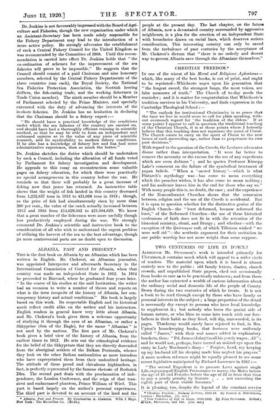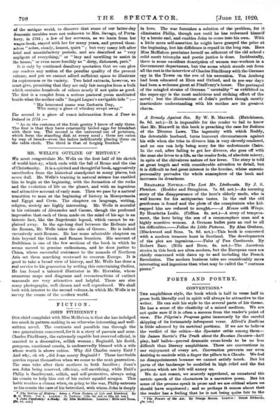TWO CENTURIES OF LIFE IN DOWN.t
ALTHOUGH Mr. Stevenson's work is intended primarily for Ulstermen, it contains much which will appeal to a wider circle of readers. The material upon which it is based is almost entirely new to the public : old family letters, diaries, church records, and unpublished State papers, eked out occasionally from books so rare as to be practically unknown ; and from these
the author has extracted a wealth of curious information about the ordinary social and domestic life of the people of County Down during the two centuries of which he treats. It is not a book to be read through except by those who have family or personal interests in the subject ; a large proportion of the detail is necessarily dry except to persons who have local knowledge to supplement it ; but nobody who loves the quaint side of human nature, or who likes to come into touch with our fore- fathers in their habit as they lived, will dip, unrewarded, in its pages. Thackeray would surely have rejoiced to find, in Mrs.
Upton's housekeeping books, that footmen were uniformly called " James," with their real names added in explanatory brackets, thus : " Pd. James (John) Small his yearly wages.. " ; and he would not, perhaps, have turned an unkind eye upon the entry in Lady Mordaunt's diary : " Forgive, Lord, my keeping up my husband till his sleeping made him neglect his prayers." A more modern reformer might be equally pleased to see some recent legislation anticipated by Richard Lawrence in 1682 :-
" The second Expedient is to procure Laws against single Life, enjoyning all English Protestants to marry, the Males before the age of 25 and Females before the age of 22 or from that time to pay a yearly penalty by Statute . . . not exceeding the eighth part of their visible Incomes."
It is pleasing, too, despite the legend of the constant service
• ChriMian Freedom : Holman Lcdoree. 1918-10. By Francis E. Hutchinson. London : Macmillan. 15s. not.] t Two Centuries of Life in Down, 1600-1800. By John Stevenson. Belfast: krCaw. Stevenson. and On. [21z. net-1
of the antique world, to discover that some of our latter-day domestic troubles were not unknown to Mrs. Savage, of Porta- ferry, in 1781 ; a few of her servants, as we learn from her wages-book, stayed with her for many years, and proved them- selves " sober, steady, honest, quiet " ; but very many left after brief and unsatisfactory periods, and are described as " very negligent of everything," or " lazy and unwilling to assist in the house," or even more forcibly as " dirty, dishonest, pert." It is only by continued desultory quotation that we can give our readers any notion of the peculiar quality of the present volume, and yet we cannot afford sufficient apace to illustrate
its copiousness or its variety. Two brief extracts, however, we must give, premising that they are only fair samples from a bulk which contains hundreds of others nearly if not quite as good.
The first is a couplet from a serious pastoral poem meditated beside what the author calls " limpid Lagan's navigable tide " :— " His honoured name was Zaeharia Day, Who many a glass of whiskey swept away."
The second is a piece of exact information from A Tour in Ireland in /77,5 :-
" As to the customs of the Irish gentry I know of only three. The first is that they have constantly boiled eggs for breakfast with their tea. The second is the universal use of potatoes, which form the standing dish at every meal ; these are eaten by way of bread—even the ladies indelicately placing them on the table cloth. The third is that of forging franker."







































 Previous page
Previous page